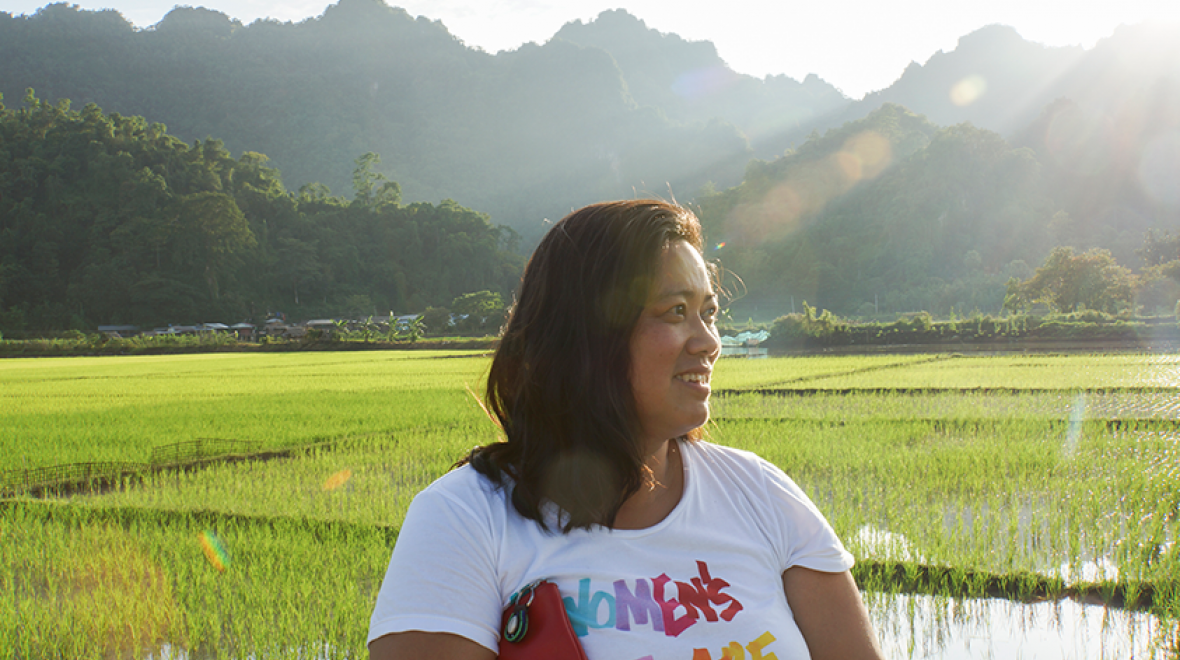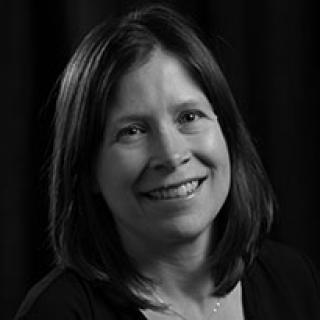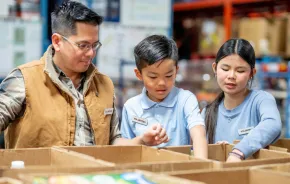
Photo:
Pwint Htun in Myanmar. Photo credit: Paula Bock
As they fled Myanmar last year, many Rohingya refugees grabbed their solar panels. Why carry something so burdensome? A solar panel can charge a mobile phone — a direct lifeline to loved ones.
Pwint Htun is largely responsible for getting that lifeline into the hands of Myanmar’s rural poor. Since 2012, the Seattle-based engineer and telecom executive has worked to bring mobile phone coverage to her native country. By and large, she has succeeded. In 2013, Myanmar was the third-least-connected country in the world (a SIM card alone cost $1,500 for terrible service, and that in only the more urban areas). Today, 83 percent of households have mobile phones, which can cost less than $25.
Htun knows what a phone can do for a family. Her own family fled Myanmar for the Thailand-Cambodia border in the 1980s during a military crackdown on democratic protesters. (Her mother, a physician, had offered care to injured protesters, which government officials saw as an act of rebellion.)
When she later moved to the U.S., Htun took a minimum-wage job at a Northgate Mall kiosk selling long-distance calling plans for Sprint because the perk of that job was free long distance. “Every lunch break, I was on the phone to Asia,” she says. (Also on those calls: third-party censors in Myanmar who actively commented during the calls — a reminder of the very government that forced her family to flee.)
Htun became an American citizen and studied electrical engineering at the University of Washington. She began working at tech companies such as Hewlett Packard and T-Mobile and sometimes spoke to her colleagues of her hope to someday connect all families in Myanmar. Then, in 2011, she found a way to make her dreams a reality when she made a tech-savvy ally in Myanmar’s deputy minister of communications, who also wanted to improve the country’s telecommunications.
Htun has since advised the World Bank on her telecommunications initiative and recently cowrote a study funded by the Bill & Melinda Gates Foundation about her work. Now, she’s taking that work to a new level by bringing mobile financial services to Myanmar’s rural poor.
By and large you’ve achieved your goal to bring mobile service to rural Myanmar. Now you’re focused on bringing mobile financial services to these same places. Tell me about the next phase in your work.
I want sending money to each other to be as easy as sending a text message. I based my plan on what I have seen in East Africa. I saw women getting out of poverty using mobile financial services. In China, people send money as a QR code, so it leapfrogs the ATM system. A phone can be a wallet. It’s possible.
How would mobile financial services serve the rural poor in particular?
In Burma [editor’s note: The country of Myanmar was formerly known as Burma, the name that Htun prefers to use], banks don’t have the infrastructure to serve people in rural areas. Without electricity, banks can’t even set up ATM machines. By 2020, we are hoping to have “human ATMs” run by people who own corner grocery stores.
In the past, people have used a hundi system, where migrant workers would send money back to family through people they trusted. This takes time, and there’s a risk of theft. There have been cases where someone left town with all [the worker’s] money. Before the telecom network, they didn’t even know if the money made it.
And if you talk to children who have dropped out of school, they say, “Oh, my family had a family emergency; we had to sell our cow or I had to drop out of school.” If people aren’t connected financially, family emergencies have a much greater long-term impact … I want to create a social safety net.
Much of your work focuses specifically on women and mothers. Why?
For women in rural areas, access to a bank account is challenging. A lot of the time, the assets are in the man’s name. Time is more limited for women, who also have household chores. Women prioritize their family, and we have found that access to technology and finance, whatever gains that she has, she shares it with her family.
[For the study with the Gates Foundation] we talked with several women’s savings groups that really bring women together and empower women. … [In such groups,] women can pool some of the money to do something that is a common good, such as buy rice right after harvest when the prices are low … and sell it when the rice price goes up. They make money this way.
The people who control the money in these villages have the power, so if women can work collectively and start saving money and start handling money themselves, they start to have access to finance. Then they can choose to empower themselves financially.
Who inspires you to do this work?
My mother is one of my heroes. She is one of the most dedicated, service-oriented people I’ve ever known [and] having been raised by a single mother, I’ve seen the dedication of a mother to her children.
My mother has always worked to serve marginalized populations. [As a physician,] she could have chosen to stay and work in the urban areas, but she chose to work in the rural areas … [and] after we fled Burma, she worked with Cambodian, Laotian and Burmese refugees.
She’s now in her 70s and retired [but] she just went to the Thai-Burmese border to train medics at a free clinic. I worried. I didn’t want her to go; I wanted her to slow down. But that’s not happening. Her values shaped me and my sisters, [and] I’m trying to follow her footsteps any way I can.











